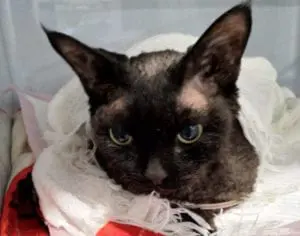[vc_row css_animation=”” row_type=”row” use_row_as_full_screen_section=”no” type=”full_width” angled_section=”no” text_align=”left” background_image_as_pattern=”without_pattern”][vc_column][vc_column_text]
What do they protect against?
Feline core vaccinations protect against feline Panleucopaenia or feline Parvovirus, and two common causes of cat-flu; Calicivirus, and viral Rhinotracheitis.
Feline parvovirus is highly contagious and kittens are the most susceptible to developing severe disease. Clinical signs include vomiting, diarrhoea, depression and abdominal pain. If female cats become infected with feline panleucopaenia whilst pregnant, they may abort their pregnancy, or the kittens may be born with abnormalities and neurological issues.
Feline Calicivirus and viral Rhinotracheitis both cause respiratory disease in cats, and it is easily spread between unprotected cats. Clinical signs of these respiratory diseases include sneezing, conjunctivitis, nasal and ocular discharge, reduced appetite, and ulcerations in the mouth.
Two other diseases in cats include Feline Immunodeficiency virus, or FIV and Feline Leukaemia virus, or FeLV. FIV is readily transmissible between cats via bites or scratches, whilst FeLV is transmitted by friendly contact between cats, via saliva, tears, urine and faeces. Both FIV and FeLV can cause immunodeficiency, meaning infected cats and kittens are prone to secondary infections. If you have an outdoor cat, we strongly recommend testing for FIV and if they are negative, commencing vaccination.
The vaccination protocol for the feline core diseases involves a 3-dose course starting at 6-8 weeks, 10-12weeks, and 14-16 weeks. Vaccination for kittens or adults against FIV also involves a three dose course, though the vaccines are given 2 weeks apart; for example, at 10 weeks, 12 weeks, and 14 weeks of age. After the initial treatment course, vaccination boosters are required yearly for both the F3 core vaccines, and FIV.
[/vc_column_text][vc_separator type=”normal” up=”40″ color=”#eeeeee” thickness=”1″ down=”40″][vc_column_text]The core canine vaccinations are very important to keep your furry companion healthy. Most people know that the core vaccination protects against the deadly Parvovirus, but don’t know about the other components in the vaccination. Canine core vaccines, or C3 vaccinations, protect against Parvovirus, Canine Distemper and Adenovirus/hepatitis. The diseases covered by core vaccinations have significant morbidity and mortality, and are generally widely distributed in the environment. A recommended optional vaccination is for canine cough; vaccination protects against the virus Parainfluenza and the bacteria Bordetella, which are two potential causes of canine cough.
The vaccine protocol at the Windaroo Veterinary Surgery for puppies includes a C3 as the first vaccination at 6-8 weeks of age- this stimulates your puppies immune system to produce antibodies against these viruses. The second vaccination is due at 10-12 weeks of age, and includes the C3 as well as canine cough. The advantage of using the vaccines we stock is that puppies do not need a third vaccination, and can go out into the wide world to socialise during their critical period. This helps ensure puppies grow up to be well rounded, sociable pets.
In adult dogs, we recommend triennial C3 vaccinations, and annual canine cough vaccination. If you are unsure what your dog or puppy requires, please call the surgery on 38073699 to discuss your options.[/vc_column_text][vc_separator type=”transparent” up=”30″][vc_single_image image=”16824″ img_size=”full” qode_css_animation=””][/vc_column][/vc_row]




